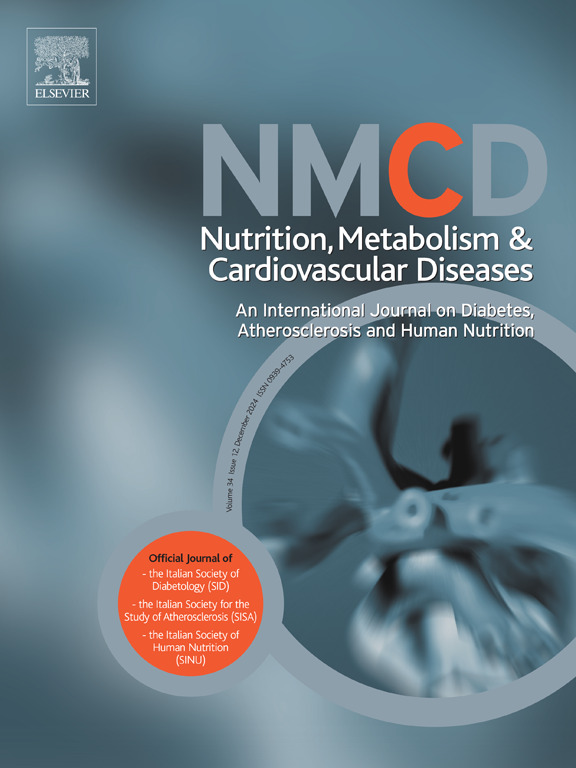The impact of environmental pollution on metabolic health and the risk of non-communicable chronic metabolic diseases in humans
IF 3.3
3区 医学
Q2 CARDIAC & CARDIOVASCULAR SYSTEMS
Nutrition Metabolism and Cardiovascular Diseases
Pub Date : 2025-03-08
DOI:10.1016/j.numecd.2025.103975
引用次数: 0
Abstract
Aims
This review aims to provide a comprehensive overview to understand the role of pollution in the development of noncommunicable diseases (NCDs), with a focus on metabolic diseases.
Data synthesis
In the context of NCDs, the incidence of metabolic diseases such as obesity and diabetes are increasing at an alarming rate. In addition to the well-known role of the so-called “obesogenic” environment, characterized by unhealthy diet and physical inactivity, great attention has been paid in recent years to the effects of pollution. Indeed, progressive urbanization has been associated with increased exposure to pollutants. The harmful effects of some pollutants on the endocrine system have been known for decades, but data on the metabolic impact of pollution are rather recent. Pollution in its various forms promotes a systemic inflammatory state, insulin resistance, and oxidative stress, which appear to be closely associated with increased risk of NCD, particularly obesity and diabetes.
Conclusions
In conclusion, urbanization has so far had a predominantly negative impact on collective health, but a better understanding of the mechanisms linking pollution to metabolic health is crucial to implement preventive strategies, including careful urban planning to improve community health, understood not only as the absence of disease but also as psychological and social well-being, overcoming the risks associated with urbanization.
环境污染对人类代谢健康和非传染性慢性代谢性疾病风险的影响。
目的:本综述旨在提供一个全面的概述,以了解污染在非传染性疾病(NCDs)发展过程中的作用,重点关注代谢性疾病:在非传染性疾病方面,肥胖症和糖尿病等代谢性疾病的发病率正以惊人的速度增长。除了众所周知的以不健康饮食和缺乏体育锻炼为特征的所谓 "致肥 "环境的作用外,近年来污染的影响也备受关注。事实上,逐步城市化与接触污染物的机会增加有关。一些污染物对内分泌系统的有害影响早已为人所知,但有关污染对新陈代谢影响的数据却是最近才有的。各种形式的污染会促进全身炎症状态、胰岛素抵抗和氧化应激,这似乎与非传染性疾病(尤其是肥胖症和糖尿病)风险的增加密切相关:总之,迄今为止,城市化对集体健康的影响主要是负面的,但更好地了解污染与代谢健康之间的关联机制对于实施预防性战略至关重要,包括通过精心的城市规划来改善社区健康(不仅指没有疾病,还包括心理和社会福祉),从而克服与城市化相关的风险。
本文章由计算机程序翻译,如有差异,请以英文原文为准。
求助全文
约1分钟内获得全文
求助全文
来源期刊
CiteScore
6.80
自引率
2.60%
发文量
332
审稿时长
57 days
期刊介绍:
Nutrition, Metabolism & Cardiovascular Diseases is a forum designed to focus on the powerful interplay between nutritional and metabolic alterations, and cardiovascular disorders. It aims to be a highly qualified tool to help refine strategies against the nutrition-related epidemics of metabolic and cardiovascular diseases. By presenting original clinical and experimental findings, it introduces readers and authors into a rapidly developing area of clinical and preventive medicine, including also vascular biology. Of particular concern are the origins, the mechanisms and the means to prevent and control diabetes, atherosclerosis, hypertension, and other nutrition-related diseases.

 求助内容:
求助内容: 应助结果提醒方式:
应助结果提醒方式:


